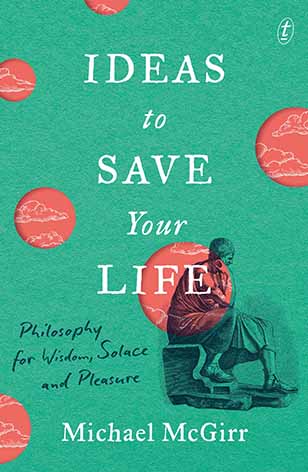 At first sight Ideas to Save your Life can seem a little daunting. We can associate philosophy with systems of thought and steel-trap minds, with isms and fences that separate acceptable from unacceptable thought. Michael McGirr’s previous writing, including Books that Saved my Life, however, inspired confidence. His natural instinct on finding a fence is always to find a gap through which to sneak, not to put barbed wire on top of it to prevent people from trespassing.
At first sight Ideas to Save your Life can seem a little daunting. We can associate philosophy with systems of thought and steel-trap minds, with isms and fences that separate acceptable from unacceptable thought. Michael McGirr’s previous writing, including Books that Saved my Life, however, inspired confidence. His natural instinct on finding a fence is always to find a gap through which to sneak, not to put barbed wire on top of it to prevent people from trespassing.
In Ideas to Save Your Life philosophy is a dialogue in which people’s existential questions are met with similar questions. In each chapter McGirr begins with incidents and encounters in his own life that evoked these large questions. They include especially encounters with his secondary school students which raised large questions about the meaning of life. These stories then lead him to reflect on the way different philosophers respond to a related existential question. The philosophers are seen neither as fellow walkers, strugglers, seekers of meaning, whose ideas are incomplete but are worthy of respect. The humorous and passionate style of the book expresses this sense of being fallible companions in a shared enterprise.
The range of philosophers mentioned is a tribute to McGirr’s reading and human sympathy.
They include thinkers who in their lifetime were often dismissed as eccentric or subversive. Among them are Cavendish, Kierkegaard, Nietzsche, Simone Weil and Alan Turing. The oddities of their behaviour and the wildness of their language can conceal their seriousness in commending an understanding of human life that transcends self-satisfied blandness. The book endorses their quest.
McGirr draws on their questions and ideas when facing in his school community the refusal or inability to recognise the importance of large and troubling questions about life and its meaning. For him young people are short changed when they are encouraged to assume that a life measured by individual satisfaction, security, career, wealth and status is a good life. In his accompaniment of students in the classroom, in times of crisis and in their meetings with people who are homeless or in great poverty in Melbourne or in Africa McGirr is clearly an extraordinary gift to any institution in which he teaches.
The book concludes with a bow to the philosopher Descartes. Its final section is entitled I Think, Therefore I Thank. The title does more than decorate the courtesy or duty to acknowledge people. The life that Michael McGirr commends is one that risks insecurity, is sensitive to one’s fragility and fallibility, compassionate to other human beings, and full of wonder at a beautiful and death-marked world. The natural response to such a world is one of gratitude. Ideas to Save Your Life, too, will be a source of gratitude for any teacher who reads it.
Ideas to Save your Life: Philosophy for Wisdom, Solace and Pleasure
Michael McGirr
TEXT PUBLISHING
ISBN 9781922330871